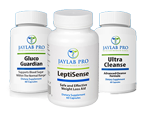


No shortcuts or cheap imitations.
Plus toll-free telephone orders, too!
Can you Heal A Diseased Heart?
By Kevin DiDonato MS, CSCS, CES
Damage to the cardiovascular system due to injury, illness, or surgery, may lead to inflammation and a slower recovery from the injury.
Processes like angioplasty, coronary artery bypass, or other procedures may damage healthy cells in your vascular system, therefore increasing the risk for an inflammatory response.
The recovery time for a procedure like this can vary from person to person.
But most of the time, due to the nature of the injury, it could be inevitable that you will have some level of inflammation present in your body.
So the question remains: can you heal a diseased heart?…
Omega-3 Fatty Acids and Inflammation
There is a growing body of evidence that shows omega-3 fatty acids may be potent fighters against inflammation.
The studies are showing that omega-3 fatty acids contain powerful compounds – called D-series resolvins – that may control inflammation.
However, very little evidence is known about how these compounds control inflammation due to vascular injury.
Until now!
Researchers, using rabbits undergoing an angioplasty procedure, were given a local dose of D-series resolvins to determine its effects on injuries following the procedure.
Here’s what they found:
They noticed that cell-proliferation (51 percent) and leukocyte recruitment (41 percent) were decreased at day three following the balloon-injury (angioplasty).
They also noticed that neointimal hyperplasia (29 percent) was slowed at day 28.
The authors also noted the production of proresolving lipid (fat) mediators, and the expression of receptors for D-series resolvins on the arterial wall increased with supplementation.
They concluded:
“D-series resolvins (RvD) broadly reduce vascular smooth muscle cell responses and modulate vascular injury, suggesting that local activation of resolution mechanisms expedites vascular homeostasis.”
Simply put: specialized compounds found in omega-3 fatty acids – called D-series resolvins (RvD) may reduce the effects associated with injury to the vascular wall in your arteries.
Also, those same compounds may activate certain areas on the arterial wall that could speed recovery from the injury, therefore promoting faster homeostasis.
Omega-3 Fatty Acids and Vascular Injury
There are many different processes that may increase injury and damage to the cells of your body.
In your heart, procedures such as angioplasty may result in injury and the associated immune response to speed healing.
Typically, this leads to increased inflammation levels, which could possibly slow the healing process.
Now, according to the results of this study, specific compounds found in omega-3 fatty acids – called D-series resolvins – may reduce inflammation levels, therefore speeding up the recovery to the injured area.
Omega-3 fatty acids have also been shown to improve many different areas of health – including overall heart health, by reducing total cholesterol, triglycerides, and increasing HDL cholesterol and reducing inflammation due to injury.
Is Krill Oil 47 X More Powerful Than Regular Fish Oil? >>
References:
Miyahara T, Runge S, Chatterjee A, Chen M, Mottola G, Fitzgerald JM, Serhan CN, Conte MS. D-series reolvin attenuates vascular smooth muscle cell activation and neointimal hyperplasia following vascular injury. The FASEB Journal. 2013 June;27(6):2220-2232.

![]() We are a GMP
Rated facility, so what we say is in the bottle is really IN the bottle.
Sure, it's extremely difficult to get certified,
but we feel the extra effort is worth it. Don't you agree?
We are a GMP
Rated facility, so what we say is in the bottle is really IN the bottle.
Sure, it's extremely difficult to get certified,
but we feel the extra effort is worth it. Don't you agree?
 If you order a JayLabPro SmartShip product or any Combo Package, we will automatically ship you a new supply of the product or products you have ordered every month, starting 30 days after your initial order is shipped, and continuing until you cancel. The credit card you are using today will be billed the lowest available price for those product or products when your order is shipped, but shipping will be FREE. You may log into your customer account or call our customer service department toll-free at 1-888-9GETPRO (1-888-943-8776) between the hours of 8am – 9pm EST Mon-Fri to cancel future shipments, customize the timing of your shipments, or change the credit card used for billing.
If you order a JayLabPro SmartShip product or any Combo Package, we will automatically ship you a new supply of the product or products you have ordered every month, starting 30 days after your initial order is shipped, and continuing until you cancel. The credit card you are using today will be billed the lowest available price for those product or products when your order is shipped, but shipping will be FREE. You may log into your customer account or call our customer service department toll-free at 1-888-9GETPRO (1-888-943-8776) between the hours of 8am – 9pm EST Mon-Fri to cancel future shipments, customize the timing of your shipments, or change the credit card used for billing.









